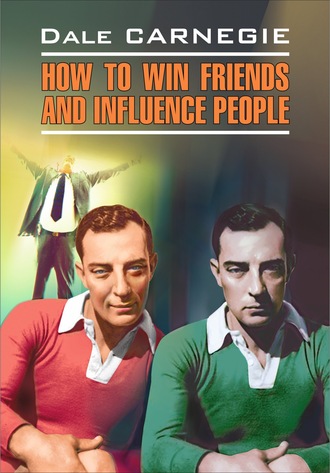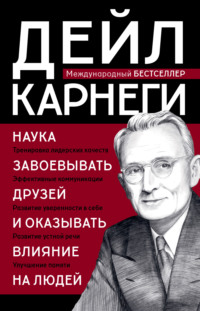
Полная версия
How to win Friends and influence People / Как завоевывать друзей и оказывать влияние на людей. Книга для чтения на английском языке
Sincerely,
Barbara L. AndersonDo you think Mrs. Anderson received any response from that letter? Eleven of the twelve banks invited her to be interviewed, and she had a choice of which bank’s offer to accept. Why? Mrs. Anderson did not state what she wanted, but wrote in the letter how she could help them, and focused on their wants, not her own.
Thousands of salespeople are pounding the pavements today, tired, discouraged and underpaid. Why? Because they are always thinking only of what they want. They don’t realize that neither you nor I want to buy anything. If we did, we would go out and buy it. But both of us are eternally interested in solving our problems. And if salespeople can show us how their services or merchandise will help us solve our problems, they won’t need to sell us. We’ll buy. And customers like to feel that they are buying – not being sold.
Yet many salespeople spend a lifetime in selling without seeing things from the customer’s angle. For example, for many years I lived in Forest Hills, a little community of private homes in the center of Greater New York. One day as I was rushing to the station, I chanced to meet a real-estate operator who had bought and sold property in that area for many years. He knew Forest Hills well, so I hurriedly asked him whether or not my stucco house was built with metal lath or hollow tile. He said he didn’t know and told me what I already knew – that I could find out by calling the Forest Hills Garden Association. The following morning, I received a letter from him. Did he give me the information I wanted? He could have gotten it in sixty seconds by a telephone call. But he didn’t. He told me again that I could get it by telephoning, and then asked me to let him handle my insurance.
He was not interested in helping me. He was interested only in helping himself.
J. Howard Lucas of Birmingham, Alabama, tells how two salespeople from the same company handled the same type of situation. He reported:
“Several years ago I was on the management team of a small company. Headquartered near us was the district office of a large insurance company. Their agents were assigned territories, and our company was assigned to two agents, whom I shall refer to as Carl and John.
“One morning, Carl dropped by our office and casually mentioned that his company had just introduced a new life insurance policy for executives and thought we might be interested later on and he would get back to us when he had more information on it.
“The same day, John saw us on the sidewalk while returning from a coffee break, and he shouted: ‘Hey Luke, hold up, I have some great news for you fellows.’ He hurried over and very excitedly told us about an executive life insurance policy his company had introduced that very day. (It was the same policy that Carl had casually mentioned.) He wanted us to have one of the first issued. He gave us a few important facts about the coverage and ended saying, “The policy is so new, I’m going to have someone from the home office come out tomorrow and explain it. Now, in the meantime, let’s get the applications signed and on the way so he can have more information to work with.’ His enthusiasm aroused in us an eager want for this policy even though we still did not have details. When they were made available to us, they confirmed John’s initial understanding of the policy, and he not only sold each of us a policy, but later doubled our coverage.
“Carl could have had those sales, but he made no effort to arouse in us any desire for the policies.”
The world is full of people who are grabbing and self-seeking. So the rare individual who unselfishly tries to serve others has an enormous advantage. He has little competition. Owen D. Young, a noted lawyer and one of America’s great business leaders, once said: “People who can put themselves in the place of other people, who can understand the workings of their minds, need never worry about what the future has in store for them.”
If out of reading this book you get just one thing – an increased tendency to think always in terms of other people’s point of view, and see things from their angle – if you get that one thing out of this book, it may easily prove to be one of the building blocks of your career.
Looking at the other person’s point of view and arousing in him an eager want for something is not to be construed as manipulating that person so that he will do something that is only for your benefit and his detriment. Each party should gain from the negotiation. In the letters to Mr. Vermylen, both the sender and the receiver of the correspondence gained by implementing what was suggested. Both the bank and Mrs. Anderson won by her letter in that the bank obtained a valuable employee and Mrs. Anderson a suitable job. And in the example of John’s sale of insurance to Mr. Lucas, both gained through this transaction.
Another example in which everybody gains through this principle of arousing an eager want comes from Michael E. Whidden of Warwick, Rhode Island, who is a territory salesman for the Shell Oil Company. Mike wanted to become the Number One salesperson in his district, but one service station was holding him back. It was run by an older man who could not be motivated to clean up his station. It was in such poor shape that sales were declining significantly.
This manager would not listen to any of Mike’s pleas to upgrade the station. After many exhortations and heart-to-heart talks – all of which had no impact – Mike decided to invite the manager to visit the newest Shell station in his territory.
The manager was so impressed by the facilities at the new station that when Mike visited him the next time, his station was cleaned up and had recorded a sales increase. This enabled Mike to reach the Number One spot in his district. All his talking and discussion hadn’t helped, but by arousing an eager want in the manager, by showing him the modern station, he had accomplished his goal, and both the manager and Mike benefited.
Most people go through college and learn to read Virgil and master the mysteries of calculus without ever discovering how their own minds function. For instance: I once gave a course in Effective Speaking for the young college graduates who were entering the employ of the Carrier Corporation, the large air-conditioner manufacturer. One of the participants wanted to persuade the others to play basketball in their free time, and this is about what he said: “I want you to come out and play basketball. I like to play basketball, but the last few times I’ve been to the gymnasium there haven’t been enough people to get up a game. Two or three of us got to throwing the ball around the other night – and I got a black eye. I wish all of you would come down tomorrow night. I want to play basketball.”
Did he talk about anything you want? You don’t want to go to a gymnasium that no one else goes to, do you? You don’t care about what he wants. You don’t want to get a black eye.
Could he have shown you how to get the things you want by using the gymnasium? Surely. More pep. Keener edge to the appetite. Clearer brain. Fun. Games. Basketball.
To repeat Professor Overstreet’s wise advice: First, arouse in the other person an eager want. He who can do this has the whole world with him. He who cannot walks a lonely way.
One of the students in the author’s training course was worried about his little boy. The child was underweight and refused to eat properly. His parents used the usual method. They scolded and nagged. “Mother wants you to eat this and that.” “Father wants you to grow up to be a big man.”
Did the boy pay any attention to these pleas? Just about as much as you pay to one fleck of sand on a sandy beach.
No one with a trace of horse sense would expect a child three years old to react to the viewpoint of a father thirty years old. Yet that was precisely what that father had expected. It was absurd. He finally saw that. So he said to himself: “What does that boy want? How can I tie up what I want to what he wants?”
It was easy for the father when he started thinking about it. His boy had a tricycle that he loved to ride up and down the sidewalk in front of the house in Brooklyn. A few doors down the street lived a bully – a bigger boy who would pull the little boy off his tricycle and ride it himself.
Naturally, the little boy would run screaming to his mother, and she would have to come out and take the bully off the tricycle and put her little boy on again. This happened almost every day.
What did the little boy want? It didn’t take a Sherlock Holmes to answer that one. His pride, his anger, his desire for a feeling of importance – all the strongest emotions in his makeup – goaded him to get revenge, to smash the bully in the nose. And when his father explained that the boy would be able to wallop the daylights out of the bigger kid someday if he would only eat the things his mother wanted him to eat-when his father promised him that – there was no longer any problem of dietetics. That boy would have eaten spinach, sauerkraut, salt mackerel – anything in order to be big enough to whip the bully who had humiliated him so often.
After solving that problem, the parents tackled another: the little boy had the unholy habit of wetting his bed.
He slept with his grandmother. In the morning, his grandmother would wake up and feel the sheet and say: “Look, Johnny, what you did again last night.”
He would say: “No, I didn’t do it. You did it.”
Scolding, spanking, shaming him, reiterating that the parents didn’t want him to do it – none of these things kept the bed dry. So the parents asked: “How can we make this boy want to stop wetting his bed?”
What were his wants? First, he wanted to wear pajamas like Daddy instead of wearing a nightgown like Grandmother. Grandmother was getting fed up with his nocturnal iniquities, so she gladly offered to buy him a pair of pajamas if he would reform. Second, he wanted a bed of his own. Grandma didn’t object.
His mother took him to a department store in Brooklyn, winked at the salesgirl, and said: “Here is a little gentleman who would like to do some shopping.”
The salesgirl made him feel important by saying: “Young man, what can I show you?”
He stood a couple of inches taller and said: “I want to buy a bed for myself.”
When he was shown the one his mother wanted him to buy, she winked at the salesgirl and the boy was persuaded to buy it.
The bed was delivered the next day; and that night, when Father came home, the little boy ran to the door shouting: “Daddy! Daddy! Come upstairs and see my bed that I bought!”
The father, looking at the bed, obeyed Charles Schwab’s injunction: he was “hearty in his approbation and lavish in his praise.”
“You are not going to wet this bed, are you?” the father said.
“Oh, no, no! I am not going to wet this bed.” The boy kept his promise, for his pride was involved. That was his bed. He and he alone had bought it. And he was wearing pajamas now like a little man. He wanted to act like a man. And he did.
Another father, K. T. Dutschmann, a telephone engineer, a student of this course, couldn’t get his three-year-old daughter to eat breakfast food. The usual scolding, pleading, coaxing methods had all ended in futility. So the parents asked themselves: “How can we make her want to do it?”
The little girl loved to imitate her mother, to feel big and grown up; so one morning they put her on a chair and let her make the breakfast food. At just the psychological moment, Father drifted into the kitchen while she was stirring the cereal and she said: “Oh, look, Daddy, I am making the cereal this morning.”
She ate two helpings of the cereal without any coaxing, because she was interested in it. She had achieved a feeling of importance; she had found in making the cereal an avenue of self-expression.
William Winter once remarked that “self-expression is the dominant necessity of human nature.” Why can’t we adapt this same psychology to business dealings? When we have a brilliant idea, instead of making others think it is ours, why not let them cook and stir the idea themselves. They will then regard it as their own; they will like it and maybe eat a couple of helpings of it.
Remember: “First, arouse in the other person an eager want. He who can do this has the whole world with him. He who cannot walks a lonely way.”
PRINCIPLE 3Arouse in the other person an eager want.Questions1) What conclusion did D. Carnegie arrive at, when he went fishing?
2) What is the only way to influence other people?
3) How did the Irish housemaid manage to get the calf into the barn?
4) What does A. Overstreet say about motivation of our action?
5) What is D. Carnegie’s advice of persuading somebody to do something?
6) What bit of advice about the fine art of human relations does Henry Ford give?
7) How did D. Carnegie manage to decrease rent of a ballroom?
8) What is the difference in the manner of work between two agents – Carl and John?
9) What is Professor Overstreet’s wise advice?
10) What advantage do people, who follow Professor’s Overstreet’s advice, get?
11) Why couldn’t the parents of a little thin boy cope with him?
12) How was the problem of the little boy who slept with his grandmother solved?
13) What problem did an engineer and his wife have with their three-year-old daughter?
14) What is dominating necessity in William Winter’s opinion?
In a NutshellFUNDAMENTAL TECHNIQUES IN HANDLING PEOPLEPRINCIPLE 1 Don’t criticize, condemn or complain.
PRINCIPLE 2 Give honest and sincere appreciation.
PRINCIPLE 3 Arouse in the other person an eager want.
Part two
Six ways to make people like you
I
Do this and you’ll be welcome anywhere
Why read this book to find out how to win friends? Why not study the technique of the greatest winner of friends the world has ever known? Who is he? You may meet him tomorrow coming down the street. When you get within ten feet of him, he will begin to wag his tail. If you stop and pat him, he will almost jump out of his skin to show you how much he likes you. And you know that behind this show of affection on his part, there are no ulterior motives: he doesn’t want to sell you any real estate, and he doesn’t want to marry you.
Did you ever stop to think that a dog is the only animal that doesn’t have to work for a living? A hen has to lay eggs, a cow has to give milk, and a canary has to sing. But a dog makes his living by giving you nothing but love.
When I was five years old, my father bought a little yellow-haired pup for fifty cents. He was the light and joy of my childhood. Every afternoon about four-thirty, he would sit in the front yard with his beautiful eyes staring steadfastly at the path, and as soon as he heard my voice or saw me swinging my dinner pail through the buck brush, he was off like a shot, racing breathlessly up the hill to greet me with leaps of joy and barks of sheer ecstasy.
T ippy was my constant companion for five years. Then one tragic night – I shall never forget it – he was killed within ten feet of my head, killed by lightning. Tippy’s death was the tragedy of my boyhood.
You never read a book on psychology, Tippy. You didn’t need to. You knew by some divine instinct that you can make more friends in two months by becoming genuinely interested in other people than you can in two years by trying to get other people interested in you. Let me repeat that. You can make more friends in two months by becoming interested in other people than you can in two years by trying to get other people interested in you.
Yet I know and you know people who blunder through life trying to wigwag other people into becoming interested in them.
Of course, it doesn’t work. People are not interested in you. They are not interested in me. They are interested in themselves – morning, noon and after dinner.
The New York Telephone Company made a detailed study of telephone conversations to find out which word is the most frequently used. You have guessed it: it is the personal pronoun “I.” “I.” “I.” It was used 3,900 times in 500 telephone conversations. “I.” “I.” “I.” “I.”
When you see a group photograph that you are in, whose picture do you look for first?
If we merely try to impress people and get people interested in us, we will never have many true, sincere friends. Friends, real friends, are not made that way.
Napoleon tried it, and in his last meeting with Josephine he said: “Josephine, I have been as fortunate as any man ever was on this earth; and yet, at this hour, you are the only person in the world on whom I can rely.” And historians doubt whether he could rely even on her.
Alfred Adler, the famous Viennese psychologist, wrote a book entitled What Life Should Mean to You.
Конец ознакомительного фрагмента.
Текст предоставлен ООО «ЛитРес».
Прочитайте эту книгу целиком, купив полную легальную версию на ЛитРес.
Безопасно оплатить книгу можно банковской картой Visa, MasterCard, Maestro, со счета мобильного телефона, с платежного терминала, в салоне МТС или Связной, через PayPal, WebMoney, Яндекс.Деньги, QIWI Кошелек, бонусными картами или другим удобным Вам способом.
Примечания
1
Sing Sing – тюрьма в Нью-Йорке
2
gift of intelligence – интеллект
3
she shook her fists at fate – сжав кулаки, она погрозила судьбе
4
“I don’t see how I could have done any differently from what I have. – Я не представляю себе, как можно было поступить иначе.
5
Judge not, that ye be not judged. – Не судите, да не судимы будете.
6
if he were in my shoes – если бы он был на моем месте
7
letters that turned the paper brown – письма, которые заставили покраснеть бумагу
8
Don’t complain about the snow on your neighbor’s roof, when your own doorstep is unclean – Увидеть в чужом глазу соринку, а в своем не заметить бревна.
9
Your bad manners are exceeded only by your bad manners – Ваши дурные манеры уступают только вашему дурному воспитанию.
10
Hold your shoulders back! – Расправь плечи!
11
It was this desire for a feeling of importance that led – Именно желание ощутить чувство собственной значимости привело…
12
secretary of state – государственный секретарь
13
these tissues are found to be apparently just as healthy as yours and mine – Было выявлено, что эти ткани такие же здоровые, как у вас и у меня.
14
whose marriage proved to be a tragedy – …замужество которой превратилось в трагедию
15
he put it on thick – зд.: он пользовался этим
16
filet mignon – нежное филе
17
the discouragement of pouring himself or herself out to an audience and not receiving a single ripple of appreciative comment – разочарование от того, что стараешься выступать перед аудиторией как можно лучше и не видишь никакой реакции
18
common sense- здравый смысл
19
was worried sick – очень беспокоилась
20
Mind you – зд.: обратите внимание
21
at a glance – с одного взгляда
22
once and for all – раз и навсегда
23
preferred list – зд.: основной список
24
You have your nerve! – зд.: Какая наглость!












